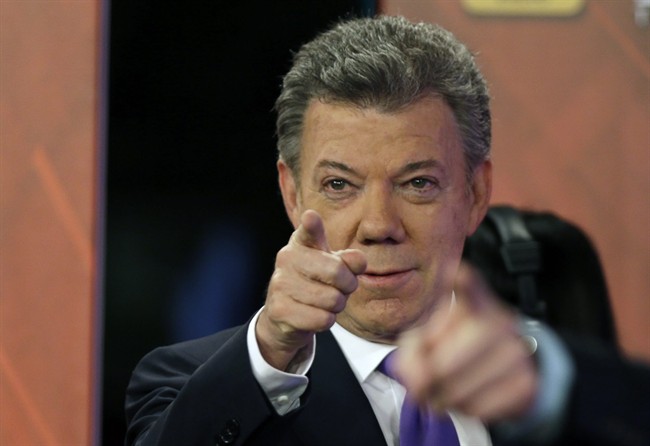BOGOTA, Colombia – Juan Manuel Santos convincingly won re-election Sunday after Colombia’s tightest presidential contest in years, an endorsement of his 18-month-old peace talks to end the Western Hemisphere’s longest-running conflict.

Santos defeated right-wing challenger Oscar Ivan Zuluaga with 53 per cent-to-47 per cent of valid votes with 99.7 per cent of precincts reporting.
Zuluaga was backed by former two-term President Alvaro Uribe, who many considered the true challenger. They accused Santos of selling Colombia out in slow-slogging Cuba-based negotiations, and insisted Zuluaga would halt the talks unless the rebel Revolutionary Armed Forces of Colombia, known as the FARC, ceased all hostilities and some of its leaders accepted jail time.
The outcome affirmed Santos’ position that he has steered Colombia to a historic crossroads after a half-century of conflict that claimed more than 200,000 lives, mostly civilians.
“Now we’re going to build this peace for which we’ve so long yearned,” said Ivan Cepeda, a leading leftist lawmaker.
READ MORE: Authorities in Colombia probe bus fire that killed 32 students
The campaign was Andean nation’s dirtiest in years, and Uribe continued to allege widespread fraud by the Santos camp right up to the closing of polls. But Zuluaga graciously conceded defeat in front of his supporters less than an hour after the result became known.
Santos’ win was a comeback of sorts – Zuluaga finished first in the election’s first round of five candidates May 25. His 900,000-vote victory Sunday hinged in large part on winning Bogota and making major gains on the Caribbean coast, where his party machinery is strong.
In the first round, Santos finished third in the capital, the stronghold of defeated leftist candidate Clara Lopez, who endorsed the president for the runoff. Voter turnout rose somewhat, too, from 40 per cent in the first round to 47 per cent Sunday, which was seen as favouring Santos.
The University of Kansas-educated incumbent got the backing last week of 80 top business leaders and announced exploratory talks with the National Liberation Army, Colombia’s other, far smaller rebel band.
Uribe had accused Santos, grandnephew of a president from a blue-blood Bogota clan that formerly owned the newspaper El Tiempo, of offering impunity to the rebels.
Bogota industrial designer Felipe Quintero said he voted for Zuluaga, a previously little-known finance minister during Uribe’s administration, because Santos was conceding too much to rebels.
“They need to be punished, not to be rewarded with liberty” and seats in Congress, Quintero said.
Santos, 62, denied he would let war criminals go unpunished.
And he is no dove. As Uribe’s defence minister and then president, he wielded Colombia’s U.S.-backed military to badly weaken the FARC, including killing its top three leaders.
Besides betting his future on peace, Santos has improved ties with the leftist governments of neighbouring Venezuela and Ecuador, a sharp contrast to Uribe.
Analyst Adam Isacson of the Washington Office on Latin America said he considered the election less a vote on the peace process than “a referendum on Alvaro Uribe and his role in Colombian society.”‘
“The eight years he was president were a time of some of the worst corruption and biggest scandals,” said Bogota business consultant Maria Eugenia Silva, citing his “‘nefarious” record as a big reason she opted for Santos.
A victory for Zuluaga would have lessened chances that Uribe might face prosecution for alleged crimes including human rights violations. Blemishes of his 2002-10 government included extrajudicial killings of innocent civilians to boost military body counts, illegal spying on judges and journalists and the funneling of agricultural subsidies to well-heeled ranchers. Uribe, who is constitutionally barred from another presidential run, won a Senate seat in March.
Zuluaga was backed by cattle ranchers and by palm oil plantation owners, beneficiaries of a deal Uribe made with far-right paramilitaries that dismantled their militias.
Big landholders had by then consolidated control over territory that the militias largely rid of rebels while driving at least 3 million poor Colombians off their lands. As part of the Santos-negotiated peace process, those stolen lands would be returned.
The slow pace of peace talks did not help the incumbent. So far only framework agreements have been reached on agrarian reform, dismantling the illegal drug trade and creating a role for rebels in national politics.
Still, the peace process ranks relatively low on most Colombians’ list of priorities. The Gallup poll found less than 5 per cent of respondents believe the FARC is Colombia’s main problem.
For many, spreading the benefits of a growing economy is more important. Economic growth averaged 4.5 per cent annually during Santos’ four years and 2.5 million jobs were added, but analysts say he has done little to improve education, health care and infrastructure.
—
Associated Press writers Cesar Garcia and Libardo Cardona contributed to this report.



Comments